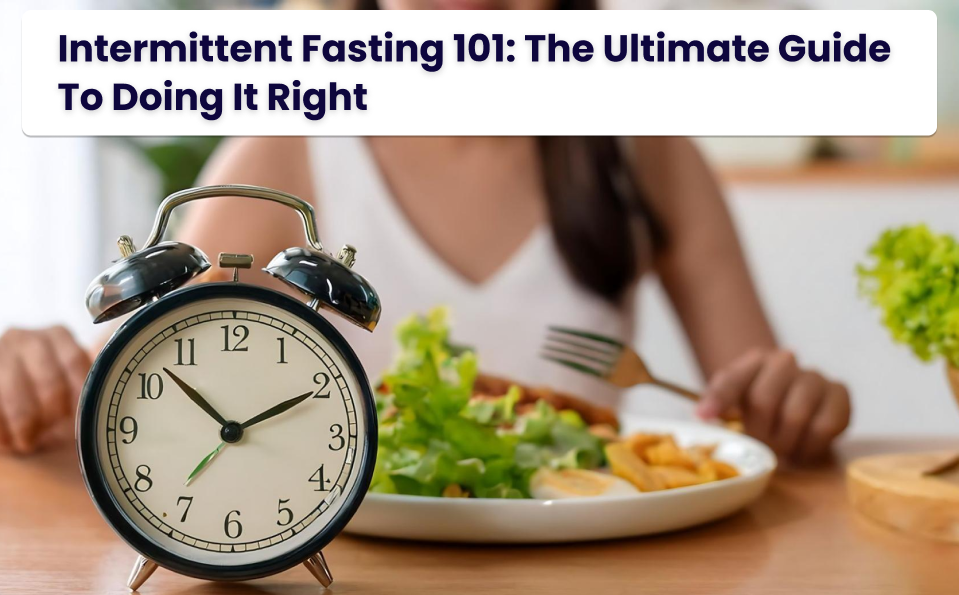
Intermittent Fasting 101: The Ultimate Guide to Doing It Right
Intermittent fasting for weight loss and overall wellness has gained popularity worldwide. If you’re curious about its potential health benefits or want to incorporate healthy eating habits into your lifestyle, this guide provides practical advice tailored for beginners and experienced fasters alike.
What Is Intermittent Fasting?
Intermittent fasting is an eating pattern that alternates between periods of eating and fasting. Unlike traditional diets, it focuses on when to eat rather than what to eat, making it a flexible approach for those seeking healthy lifestyle changes.
Popular Methods of Intermittent Fasting:
- 16/8 Method: Fast for 16 hours and eat during an 8-hour window.
- 5:2 Method: Eat normally for five days and limit calorie intake (around 500-600 calories) on the other two days.
- Eat-Stop-Eat: Fast for 24 hours once or twice a week.
These approaches make intermittent fasting suitable for various schedules, helping people achieve their weight loss goals or support better metabolic health.
Benefits of Intermittent Fasting

1.Weight Loss and Fat Reduction
Intermittent fasting may promote weight loss by reducing calorie intake and encouraging fat burning. It helps the body tap into stored fat reserves, aiding in belly fat reduction and overall body weight management.
2.Improved Metabolic Health
By enhancing insulin sensitivity, intermittent fasting can support healthier blood sugar levels. Studies suggest it may reduce the risk of developing type 2 diabetes over time.
3.Cognitive Benefits
Fasting may promote brain health by increasing the production of brain-derived neurotrophic factor (BDNF), which supports cognitive function and neuronal health.
4.Cellular Repair and Longevity
During fasting, the body initiates autophagy, a process where cells repair and regenerate. This natural detox mechanism is believed to support longevity and overall health.
5.Reduced Inflammation
Intermittent fasting may help reduce inflammation, a key factor in chronic illnesses such as heart disease and arthritis.
6.Heart Health Support
Practicing intermittent fasting alongside a balanced lifestyle may improve heart health by lowering blood pressure, reducing cholesterol levels, and supporting cardiovascular well-being.
Note: Results vary, and it’s important to consult a healthcare professional before starting any fasting routine.
Tips for Safe and Effective Intermittent Fasting
1.Start Slow
Begin with shorter fasting periods, such as the 12/12 method, and gradually increase your fasting window as you adapt.
2.Stay Hydrated
Drink plenty of water, herbal tea, or unsweetened beverages during fasting periods to prevent dehydration.
3.Choose Nutrient-Dense Foods
Break your fast with whole, nutrient-dense foods like lean proteins, healthy fats, and complex carbohydrates. Avoid processed foods and sugary snacks.
4.Monitor Your Body’s Response
Pay attention to signs like fatigue, irritability, or dizziness. Adjust your fasting schedule or consult a healthcare provider if needed.
5.Avoid Overeating
Stick to balanced portions during your eating window. Overindulging can offset the benefits of intermittent fasting and hinder your weight management efforts.
Who Should Avoid Intermittent Fasting?
While intermittent fasting can be a valuable tool for many, it’s not recommended for:
- Pregnant or breastfeeding women
- People with a history of eating disorders
- Those managing chronic health conditions like diabetes
- Underweight individuals or those with nutritional deficiencies
If you fall into any of these categories, consult a healthcare provider before attempting intermittent fasting.
Managing Social Events While Fasting

Social events can pose challenges when following an intermittent fasting plan. Here are some strategies:
- Plan Ahead: Adjust your eating window to fit the event schedule.
- Communicate Your Goals: Share your fasting routine with friends and family for better understanding.
- Focus on Socializing: Engage in conversations and activities to shift the focus away from food.
Summary
Intermittent fasting offers a flexible and sustainable approach to achieving weight management goals and enhancing overall health. By following these tips and listening to your body, you can successfully incorporate healthy lifestyle practices into your routine.
Disclaimer: This article is for informational purposes only and should not replace professional medical advice. Consult a healthcare provider before starting any new diet or fasting regimen.





